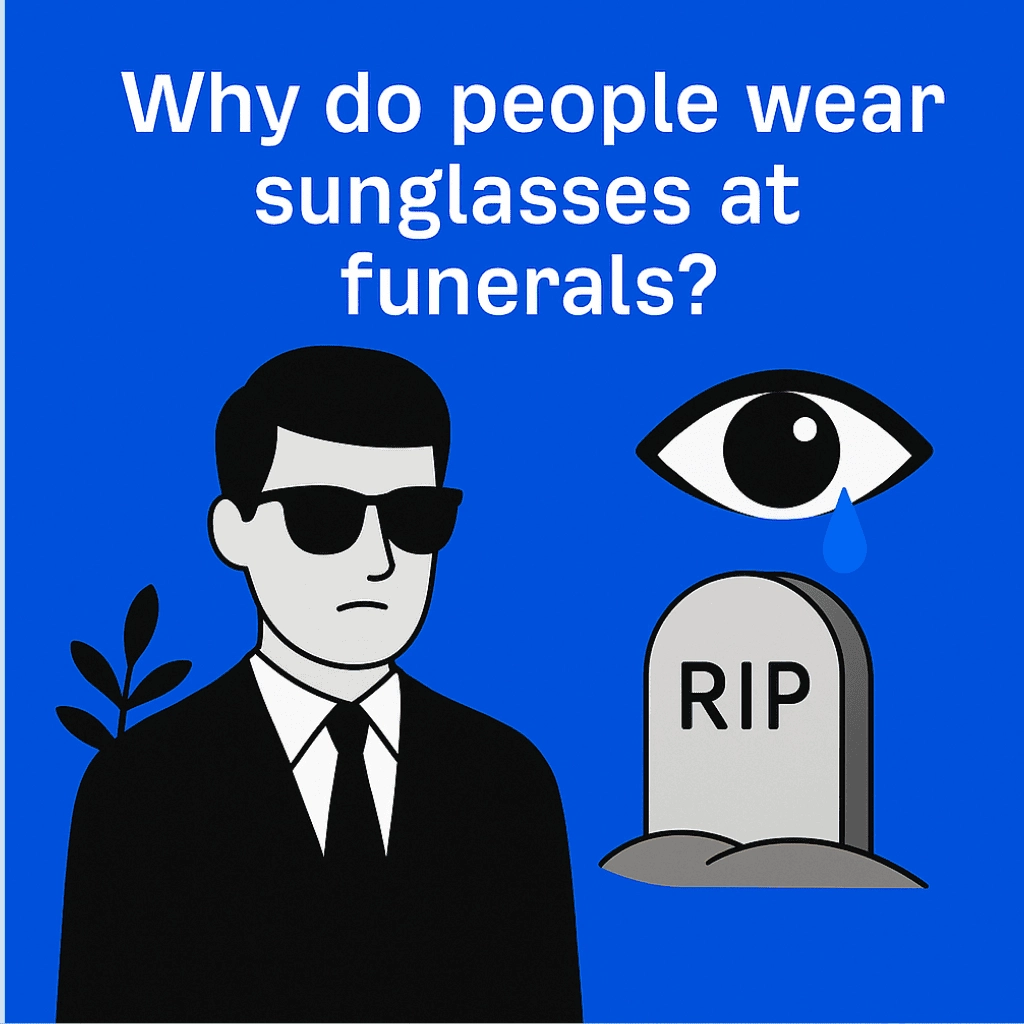Funerals are solemn occasions where emotions run high. People often wear sunglasses at funerals for various reasons. It could be to protect their emotions from the public, to maintain privacy, or even out of tradition. In this article, we will explore the reasons behind this practice, the etiquette surrounding sunglasses at funerals, and how they can impact the grieving process. This article will dive deep into the cultural, psychological, and societal aspects of wearing sunglasses at such significant events.

1. Why Do People Wear Sunglasses at Funerals?
People wear sunglasses at funerals for a variety of reasons, both psychological and practical. But here’s the kicker—it’s not always about hiding the sun or looking stylish. For many, sunglasses offer a layer of emotional protection. At a funeral, emotions are often raw, and the public setting can make some individuals feel vulnerable. What’s the real story? Wearing sunglasses can provide the wearer with a sense of security. They act as a shield, hiding tears or emotional expressions from onlookers. This allows individuals to mourn in peace without feeling exposed.
In some cases, sunglasses also serve as a practical solution for people who are already emotional. Ready for the good part? Sunglasses can help reduce the stress of being in a crowd and offer a moment of personal space during an intensely emotional occasion. On the other hand, for some, sunglasses are part of an unspoken social norm. This is where it gets interesting—in certain cultures, wearing sunglasses at a funeral is seen as a sign of respect, a way to avoid making others uncomfortable with visible signs of grief.
2. What Are the Main Reasons Behind Wearing Sunglasses at Funerals?
There are many reasons people choose to wear sunglasses at funerals, and it often has to do with the emotional burden of the event. But here’s the kicker—emotions are not just about sadness; they’re about vulnerability. Funerals, especially for close family members or friends, can bring out intense emotions. What’s the real story? Sunglasses provide a layer of privacy, which allows the mourner to control how much emotion they show in public. By hiding their eyes, they create a barrier between their internal grief and the outside world.
In addition to the emotional aspect, sunglasses serve a practical purpose. Ready for the good part? In many cases, they help shield from bright lighting during outdoor funerals. Sunglasses can also help shield eyes from being overly exposed to public attention, providing an additional layer of comfort for those who might not want to be the center of attention while mourning. This emotional and practical utility explains why sunglasses are such a common accessory at funerals.
Lastly, cultural traditions also play a role. This is where it gets interesting—some cultures consider sunglasses to be an important part of their funeral attire. This could be due to historical practices where dark glasses were worn as a sign of respect or mourning. For instance, the notion that wearing dark clothing and sunglasses expresses a level of respect for the deceased is common in several cultures around the world.
3. Is It Considered Disrespectful to Wear Sunglasses at a Funeral?
There is an ongoing debate about whether wearing sunglasses at a funeral is disrespectful. But here’s the kicker—it all depends on cultural norms and the personal preferences of the family involved. In many Western cultures, wearing sunglasses can sometimes be seen as an attempt to hide emotions, which might make others feel uncomfortable. What’s the real story? It can be perceived as a lack of emotional transparency or an attempt to avoid engaging with others’ grief. However, this is where it gets interesting—for some, the sunglasses are not a sign of disrespect but rather a tool for personal comfort during a painful event.
Cultural expectations can also vary widely. For instance, some cultures view the act of wearing sunglasses at a funeral as a respectful gesture, a means of protecting one’s emotional well-being while in a public space. Ready for the good part? In these cultures, sunglasses provide the privacy necessary to grieve without feeling exposed. Funeral etiquette experts often suggest considering the type of funeral and the preferences of the deceased’s family before making the decision to wear sunglasses.
4. When Did the Tradition of Wearing Sunglasses at Funerals Begin?
The tradition of wearing sunglasses at funerals is not widely discussed, but it has evolved over time. What’s the real story? The rise of sunglasses as a fashion item during the 20th century coincided with a change in how people viewed grief and public mourning. Ready for the good part? Sunglasses, once seen purely as a functional item, became a symbol of both privacy and fashion. Their use in public ceremonies, including funerals, began when people sought to combine the need for emotional space with the desire for subtle style.
The first known instances of sunglasses being worn at funerals were likely among the wealthy or those in the public eye. But here’s the kicker—as sunglasses became more mainstream, more people began wearing them at funerals for both emotional and stylistic reasons. This practice, which initially began as a luxury or necessity, slowly became more of a cultural norm.
This is where it gets interesting—as fashion trends change, so do funeral attire and customs. Today, sunglasses are not only functional but also serve as a symbol of personal style. Their presence at funerals reflects larger societal shifts in how we approach grief, mourning, and public displays of emotion.
5. Can Sunglasses Provide Emotional Protection at a Funeral?
Wearing sunglasses at a funeral can indeed offer emotional protection, especially for those who are struggling to cope with intense feelings. What’s the real story? Sunglasses act as a barrier, allowing mourners to grieve without feeling as though they are under a microscope. Funerals are intensely emotional occasions, and having a small personal space, even in a crowd, can make the grieving process slightly more manageable.
Ready for the good part? This emotional protection can help individuals avoid unwanted interactions or questions about their grief. Instead of feeling forced to discuss their emotions in a public setting, sunglasses allow mourners to retreat inwardly, giving them space to process their feelings. This can be especially important for those who prefer to grieve privately, yet still need to attend the funeral to honor the deceased.
It’s important to note that while sunglasses can provide this protection, they can also hinder emotional engagement with others. This is where it gets interesting—in some cases, the shield provided by sunglasses might prevent mourners from fully participating in group mourning rituals or receiving emotional support from others. Therefore, balancing personal comfort and social engagement is crucial.
6. What Types of Sunglasses Are Appropriate for Funerals?
The sunglasses worn at a funeral should be simple, understated, and respectful of the occasion. But here’s the kicker—choosing the right pair of sunglasses can make all the difference in how the wearer is perceived. Sunglasses that are too flashy or bright may be seen as disrespectful, while simple, dark glasses can offer the appropriate level of subtlety.
Ready for the good part? Opting for a pair of classic, dark-colored sunglasses without any ornate designs is usually the best choice. Subtle frames in neutral colors such as black, gray, or navy are preferred. These colors blend well with funeral attire and help maintain the somber mood of the event. Sunglasses with minimal branding or decoration are also ideal, as they do not distract from the occasion.
This is where it gets interesting—in some cases, mourners may choose sunglasses with a more personal or emotional significance. For example, a pair of sunglasses that belonged to the deceased or a family heirloom could be worn as a tribute. However, even in these instances, it’s important to ensure the sunglasses remain modest and respectful of the setting.
7. Are There Any Cultural Differences in the Practice of Wearing Sunglasses at Funerals?
Sunglasses at funerals may be accepted or even expected in some cultures, while others may consider them inappropriate. But here’s the kicker—the cultural context is key when deciding whether to wear sunglasses at a funeral. In Western cultures, sunglasses are typically used for privacy and emotional protection, as we’ve discussed. However, what’s the real story? In some Eastern cultures, the emphasis is placed on open mourning, and wearing sunglasses could be seen as hiding one’s grief.
Ready for the good part? In some countries, wearing sunglasses at funerals is not common practice, but in others, it’s part of a tradition. For instance, in some Latin American cultures, dark sunglasses are worn to avoid showing tears during public mourning. This is where it gets interesting—the significance of wearing sunglasses at funerals can vary greatly depending on local customs and personal preferences.
8. What Are the Alternatives to Wearing Sunglasses at a Funeral?
If sunglasses are not appropriate or preferred, there are other ways to manage emotional privacy at a funeral. What’s the real story? Many people opt for handkerchiefs, tissues, or veils to help shield their emotions in a public setting. These items allow mourners to maintain their dignity while still participating in the collective mourning process.
Ready for the good part? Another alternative is to focus on the clothing worn. Black attire, muted colors, and formal wear all contribute to the somber tone of a funeral. These elements of attire help the mourner maintain a respectful presence without needing sunglasses.
In some cases, individuals might choose to stay seated during certain parts of the ceremony, avoiding public displays of emotion until they feel more comfortable. This is where it gets interesting—there is no one-size-fits-all approach, and each mourner must decide what works best for them.
9. Do Sunglasses Affect Your Mourning Process at a Funeral?
The impact of sunglasses on mourning is a matter of personal preference. But here’s the kicker—some people find comfort in the emotional distance that sunglasses provide, while others feel that they hinder their ability to fully grieve. The key is understanding whether the emotional protection provided by sunglasses helps or hinders the grieving process.
What’s the real story? Sunglasses offer privacy, but they also block emotional expressions. Some mourners may feel disconnected from the grief of others or isolated behind their sunglasses. This is why it’s important to evaluate whether wearing sunglasses truly supports the healing process or if it’s keeping the mourner from fully experiencing the emotional release that can come from mourning together with others.
Ready for the good part? Understanding one’s personal emotional needs, as well as the funeral’s atmosphere, can guide the decision of whether to wear sunglasses. In some cases, refraining from sunglasses can open up opportunities for connection and support.
10. Are There Other Situations Where Wearing Sunglasses Helps in Grieving?
Sunglasses are not only worn at funerals but can be helpful during other emotional situations where privacy is needed. What’s the real story? Sunglasses serve as a protective barrier during emotional moments, especially in public settings. For example, at memorial services or during moments of grief in public spaces, sunglasses can offer the privacy needed to maintain composure.
This is where it gets interesting—many people wear sunglasses in other public mourning situations, such as during the death of a public figure or a traumatic event. These situations can cause overwhelming emotions, and sunglasses act as a shield to protect the individual from unwanted attention.
Ready for the good part? Sunglasses can even be used in situations that are not related to death, like personal crises or moments when someone feels emotionally vulnerable in a crowd.
11. What Do Funeral Etiquette Experts Think About Sunglasses?
Funeral etiquette experts have varying opinions on the practice of wearing sunglasses. What’s the real story? While some believe that sunglasses can provide necessary emotional privacy, others argue that they detract from the communal aspect of grieving. Ready for the good part? Experts often suggest considering the wishes of the deceased’s family when making the decision to wear sunglasses.
This is where it gets interesting—funeral etiquette also stresses the importance of being discreet and respectful of others’ grieving processes. Sunglasses should not be worn as a means of showing off or drawing attention to oneself.
12. Should Sunglasses Be Worn During Funerals for Celebrities or Public Figures?
At celebrity funerals or public figure memorials, the rules around wearing sunglasses can be a bit different. But here’s the kicker—public figures often have larger audiences, and wearing sunglasses can serve as a shield from the intense scrutiny that often comes with these events.
What’s the real story? Sunglasses at these types of funerals are not only practical but also part of the celebrity’s personal image. This is where it gets interesting—fans, friends, and even family members may choose to wear sunglasses as a sign of respect or solidarity.
13. How Do Different Generations View Sunglasses at Funerals?
Generational differences play a role in how sunglasses are viewed at funerals. Ready for the good part? Younger generations may be more likely to wear sunglasses as a way to protect their emotions, while older generations may see it as less respectful. The shift toward more casual mourning practices has also influenced how accessories like sunglasses are perceived at funerals.
What’s the real story? Younger mourners may feel more comfortable expressing their emotions through private means, such as wearing sunglasses. However, this is where it gets interesting—older generations may feel that sunglasses prevent the mourner from showing proper respect or engaging in group mourning.
14. What Are the Pros and Cons of Wearing Sunglasses at a Funeral?
There are both benefits and drawbacks to wearing sunglasses at a funeral. But here’s the kicker—while sunglasses can provide emotional privacy, they can also prevent others from offering support. What’s the real story? Sunglasses can help manage the emotional strain of a funeral but might also hinder the mourner’s ability to fully participate in the grieving process.
Ready for the good part? Ultimately, the decision to wear sunglasses comes down to personal choice and cultural context. It’s important to weigh the emotional protection sunglasses provide with the potential for disconnection from others during the event.
15. Conclusion: Should You Wear Sunglasses at a Funeral?
In conclusion, wearing sunglasses at a funeral is a deeply personal decision that varies depending on cultural norms, personal preferences, and the specific context of the funeral. But here’s the kicker—sunglasses can provide emotional privacy, but they can also affect the grieving process. It’s crucial to balance personal comfort with respect for the deceased and their family. What’s the real story? Whether you choose to wear sunglasses or not, the most important thing is to honor the grieving process in a way that feels authentic to you.
FAQ Section
Q1: What is the significance of wearing sunglasses at funerals?
Sunglasses at funerals offer privacy, helping mourners shield their emotions and maintain composure during an emotional event.
Q2: How does wearing sunglasses help during mourning?
Wearing sunglasses can provide a barrier to hide emotional expressions, offering comfort and privacy to those grieving.
Q3: Is it disrespectful to wear sunglasses at a funeral?
It can be seen as disrespectful in some cultures, but it’s also a personal choice for emotional protection. Understanding cultural norms is key.
Q4: What kind of sunglasses should be worn to a funeral?
Simple, dark, and understated sunglasses are best. Avoid flashy designs and opt for subtle, neutral colors.
Q5: Can wearing sunglasses at a funeral affect the grieving process?
Sunglasses can provide emotional privacy but may also hinder emotional connection with others. It’s important to assess whether they help or hinder the grieving process.

